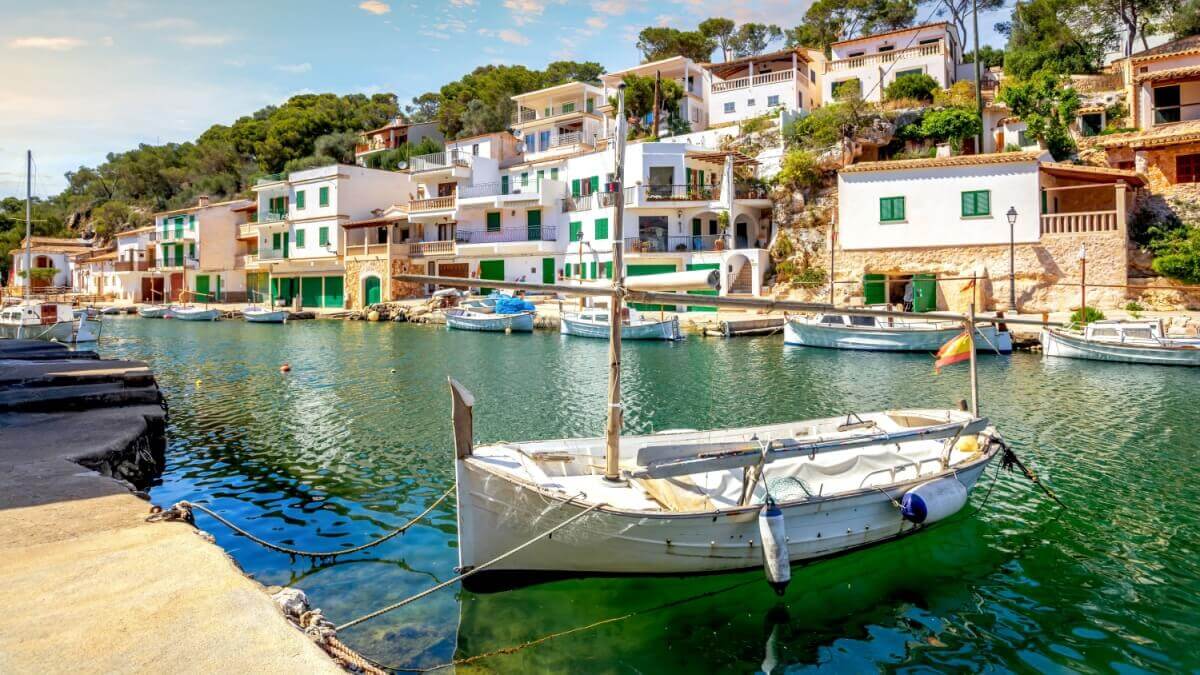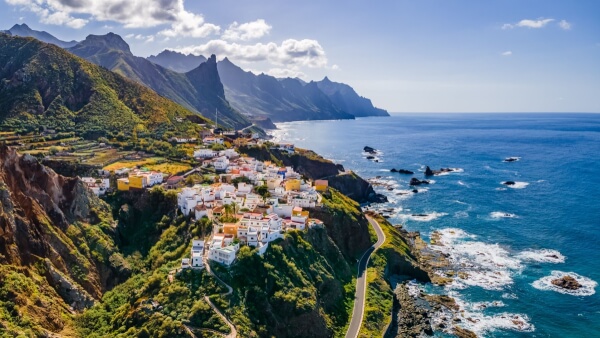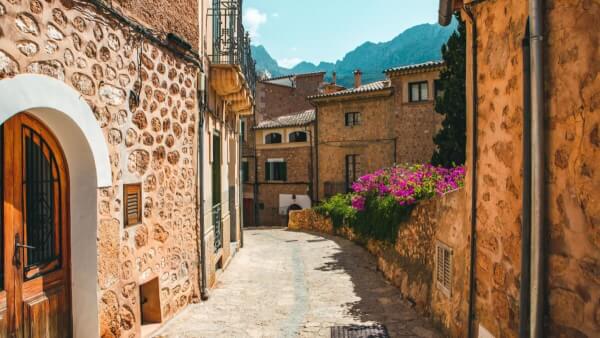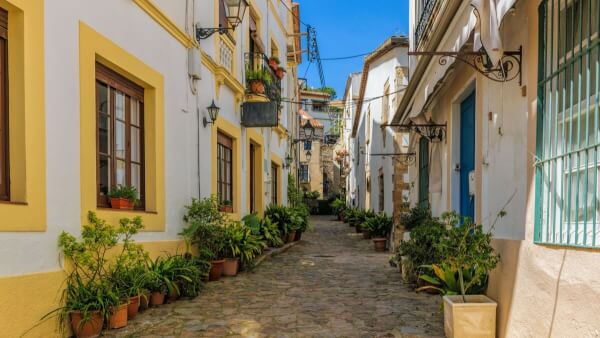Buying property in Tenerife as a foreigner: UK guide
Read our comprehensive guide to buying property in Tenerife as a foreigner, including average prices, fees, taxes and where to start house hunting.

Mallorca may be best known as a summer holiday favourite, but it’s also a place many visitors from the UK fall in love with and decide to make their home. After all, the Balearic Islands have a lot of beauty to offer: sandy beaches, clear blue waters, charming towns and relaxed island vibes.
In this guide, we’ve put together everything you need to know about buying property in Mallorca for foreigners, from how to start your search to what the buying process looks like in practice. We’ve also included details on prices, laws and local practices to keep in mind.
We’ll also introduce a reliable and cost-effective way to send and receive large sums internationally from the money services provider Wise. With low, transparent fees*, great mid-market exchange rates, and secure, trackable transfers, Wise makes international money transfers simple and stress-free.
Plus, you’ll get dedicated support and volume discounts when sending large amounts.
Get expert support for your large transfer 📞
Your house hunt will go more smoothly if you know the process up front. Here’s a quick overview of the typical steps:
Foreigners can buy property in Mallorca, so long as they have a Spanish tax ID number, better known as Número de Identificación de Extranjeros, or NIE. You can get this number by applying at your local Spanish Consulate if you’re in the UK, or at your local police station if you’re already in Mallorca.
Either way, you’ll need to make an appointment and turn up with the relevant forms and your passport.
There’s no legal requirement to have a mortgage offer in place before looking at properties in Mallorca. But getting approval in principle will show sellers you’re serious and speed things up.²
You may also want to open a Spanish bank account, so you can manage payments locally without extra hassle.³
Contracts in Spain can be complex, especially if you’re not fluent in Spanish. You don’t have to hire a lawyer, but doing so will mean you have a professional to look over the paperwork and handle the due diligence.
You’ll want to make sure your lawyer is registered with the local bar association, Colegio de Abogados. If you don’t know where to start, the UK Government website offers a directory of English-speaking lawyers abroad.
Now comes the fun part: house-hunting. Online property portals and local estate agents can be very helpful for getting your search started.
Properties in Mallorca often move fast, so try to visit places you’re interested in as soon as possible. Later on, we’ll share tips to help you make the most of your property search.
Due diligence will help prevent unwanted surprises after the purchase. A good lawyer will handle this process on your behalf, but it’s worth knowing the key steps.
One important document to take a look at is the Nota Simple. This legal document provides important facts about a property, including the owner, location and size. It also shows if there are mortgages, outstanding debts, rights of way or community charges attached to it. You or your lawyer can request a Nota Simple online through the Spanish Land Registry or in person at the local Land Registry office.⁵
Another recommended step is to arrange a building survey. A qualified surveyor can check the property for structural problems. If any hidden issues come to light, you may be able to renegotiate the price before moving forward. The surveyor should also check to make sure that the property’s characteristics match the information on record in the Nota Simple.⁶
Once you’ve chosen a property, you’re ready to make an offer. Just as in other countries, you can usually negotiate the price and conditions.
If the seller accepts your offer, you’ll move on to signing a contract of sale, commonly called a Contrato de Arras or Contrato Privado de Compraventa. This contract sets out the agreed terms and requires you to pay a deposit, typically around 10%, of the purchase price.⁸
If you’ll be getting a mortgage, now’s the time to finalise the loan arrangements with your bank.
The public deed is the final piece of paperwork that transfers ownership of the property to you. You or your lawyer with power of attorney must formally sign this document in the presence of a notary.⁹
At this stage, you pay the balance, and the deed is executed in your name, making you the new owner of the property.
Most banks in the UK don’t offer mortgages directly on overseas properties. But Spanish banks do lend to non-residents, including UK buyers. You’ll likely need a larger deposit and receive slightly higher interest rates compared to Spanish residents.
Typically, banks will lend up to 60–70% of the property’s value, and mortgage terms usually run for 20–25 years.⁸ Arrangement fees usually fall between 0.5% and 1.5% of the loan amount.⁹ Banks may also require you to take out home insurance through them.
In addition to the cost of the property itself, you’ll need to budget for both one-time purchase-related costs and ongoing taxes and fees.
Here’s a breakdown of the purchase-related costs:
Your ongoing taxes and fees will include:¹³
There’s quite a bit of regional variation when it comes to the property market in Mallorca. But overall, demand remains strong. In 2024, Balearic Islands property prices rose by 14% year on year.¹⁴
There are no nationality restrictions on owning property in Mallorca. The process for foreigners is the same as for locals, just with a few extras like obtaining an NIE if you don’t already have one.¹⁵
Spain’s Golden Visa scheme ended in April 2025. This means unless you submitted your residency application at the beginning of 2025, you no longer have a direct route to residency through buying property in Mallorca.¹⁶
The price per square meter across the Balearic Islands averages around €5,000 EUR/m². That said, how much property is in Mallorca varies widely depending on the location and type of home you choose.¹⁷
Luxury or premium areas can exceed €9,000 EUR/m², for example.¹⁸ Prices also tend to be higher in urban areas and lower in inland and rural towns.
In general, cheaper properties in Mallorca sit further inland. Of these, Sant Joan offers one of the lowest-cost options per square metre. Other affordable inland towns include Sa Pobla, Felanitx, and Inca.¹⁹
For an affordable property that still offers easy access to the beach, you might consider Muro, located about 10 km from Playa de Muro on Alcúdia Bay.
Sometimes great opportunities come through local contacts or expat groups, since Mallorca has a big international community. Additional options include:
A local agent often knows about properties that aren’t widely advertised and can guide you on specific neighbourhoods. You can also hire a buying agent, someone who works exclusively on your behalf, not the seller’s. Typically, this service comes with a fee.
Websites like Idealista, Kyero, Rightmove Overseas, JamesEdition, and Engel & Völkers list thousands of properties for sale in Mallorca. These are helpful if you’d like to get a broader view of the market, comparing locations, prices, and styles of homes.
With solid due diligence and a reliable local lawyer, you can avoid most of the pitfalls of buying property in Mallorca. Those to watch out for include:
Illegal builds or extensions. Some homes may have unapproved renovations or extensions that could cause legal issues later.
Debts tied to the property. In Spain, debts such as mortgages, unpaid taxes, or community fees are attached to the property itself, not just the seller.²⁰
Local rules and restrictions. Mallorca severely restricts and has largely frozen holiday rental licenses, so you shouldn’t expect to rent your property on Airbnb or other short-term bases unless the property comes with a valid preexisting license.²¹ In addition, if you’re buying in an apartment or gated development, homeowners’ association rules may restrict what you can do with the property.
Scams. It’s important to watch out for fake listings, title frauds, and deposit scams. To protect yourself, work with a lawyer and never transfer deposits to personal accounts.
Older homes and fincas may come with costly issues such as outdated wiring or poor insulation. Renovations and extensions are also common, but not all of them have been legally licensed.
That’s why it’s so important to do proper due diligence by reviewing the Nota Simple and arranging a building survey. If problems or unlicensed works are discovered, you may be able to use this as leverage to renegotiate the price or request fixes.
Every move involves packing, unpacking and arranging transport. But beyond the logistics, there are a few essential tasks to take care of that will make settling into your Mallorcan home much smoother.
Your bank likely requires you to take out insurance if you have a mortgage, but even if it doesn’t, it’s a good idea to arrange a buildings insurance policy starting from your completion date.
For electricity and water service, you’ll usually need to transfer existing utility contracts into your name, or in the case of a new build or long-vacant home, request reactivation.
Many homes in Mallorca rely on bottled gas or electric appliances, but if the property is connected to mains gas, you’ll also need to arrange that contract. In addition, internet and phone service will require choosing a provider and booking installation.
Spain requires an energy efficiency certificate when selling a property, which rates efficiency from A to G.²² ²³ If your new home comes with a poor rating, that’s a sign energy upgrades like better insulation or modern appliances may be worth budgeting for to lower utility bills. In some cases, you may be able to get grants or subsidies for renewable energy installations like solar panels.
Need a secure, convenient and low-cost way to send large sums of money abroad? Take a look at the Wise account from the money services provider Wise. It's not a bank account but offers some similar features and your money is safeguarded.
With Wise, you can send large amount transfers worldwide to 140+ countries for low, transparent fees* and the mid-market exchange rates with no markup.
| Here’s an overview of the main benefits of using Wise: |
|---|
|
**Investments in funds are never guaranteed and your capital can be at risk. In the UK, Interest and Stocks are provided by Wise Assets — this is the trading name of Wise Assets UK Ltd, a subsidiary of Wise. Wise Assets UK Ltd is authorised as an investment firm and regulated by the Financial Conduct Authority (FCA). Our FCA number is 839689. We do not give investment advice, and you may be subject to pay tax. If you're not sure, seek qualified advice. You can find more information about the funds on our website.
Sources used:
Sources last checked on date: 18-Sep-2025
*Please see terms of use and product availability for your region or visit Wise fees and pricing for the most up to date pricing and fee information.
This publication is provided for general information purposes and does not constitute legal, tax or other professional advice from Wise Payments Limited or its subsidiaries and its affiliates, and it is not intended as a substitute for obtaining advice from a financial advisor or any other professional.
We make no representations, warranties or guarantees, whether expressed or implied, that the content in the publication is accurate, complete or up to date.

Read our comprehensive guide to buying property in Tenerife as a foreigner, including average prices, fees, taxes and where to start house hunting.

Read our helpful guide to expat taxes in Spain, including info on how British expats are taxed in Spain and current personal income tax rates.

Read our guide on Spain spouse visa requirements, covering eligibility and documents needed to join your partner in Spain.

Read our guide to living in Spain as an expat, covering cost of living, job opportunities, healthcare and more.

Read our guide on the pitfalls of buying property in Spain and avoid the most common mistakes.

Read this helpful guide for everything you need to know about the tourist rental licence in Spain, including fees, penalties and how to apply.